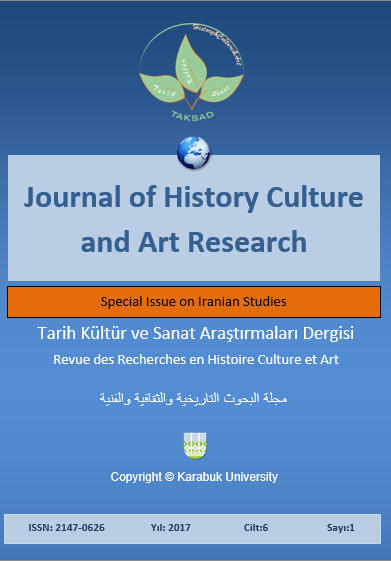Efficiency of Educational Games on Mathematics Learning of Students at Second Grade of Primary School
DOI:
https://doi.org/10.7596/taksad.v6i1.738Keywords:
Educational games, Learning, Mathematics teaching, Academic motivation.Abstract
Nowadays, children learn a lot from games, in other word these games have a constructive and educative aspect. There has been a progress in science and technology and this progress changes the people’s way of living. This development and progress also change the teaching and learning method. According to these changes, a new generation of educational tools has been designed to help the student to learn in a modern method. In general, the games are used as effective educational tools for enhancing the learning and comprehension of complex issues. The purpose of this research is the efficiency of educational games on mathematics learning of second elementary students of Tehran. This study adapted descriptive-survey method and collect data by questionnaire. Statistical population of this study is the female second student of Tehran elementary schools. 30 students have been selected as sample. These 30 students were divided into two groups of 15, one group is experiment group and the other is the control group. SPSS software was used to analyze data. Results showed that the educational games influence the motivation and mathematics learning of female second elementary students and enhance their intelligence quotient (IQ).References
Amini Far, E., Sedgpour, S. & Bahram Zadeh, H. (2012). The Effect of Computer Game on Mathematics Progress and Motivation of Students, Journal of Educational Technology, 6(3), 177-184
Anderson, K. S. (2007). Let the Game Begin: The Gaming Approach as A Paradigm in Nursing Education. Doctoral dissertation, North Carolina State University, Raleigh.
Asghari Nekah, M., Kalani, S. & Ghanaei Chaman Abad, A. (2013). An introduction to designing educational-computer games with the linguistics approach in the area of disorders especially in learning, Journal of Exceptional Education, 13(4), 36-48
Davaran, Behnaz et al. (2012). The Role of Computer Games in Identity Formation, Journal of Behavioral Science, volume 6, issue 4
Dickinson, P. & Hough, S. (2012). Using Realistic Mathematics Education in UK Classrooms. A booklet designed for teachers and students. Available on-line at: http://www.mei.org.uk/files/pdf/RME_Impact_booklet.pdf
Dye, M. W. G., Green, C. S. & Bavelier, D. (2010). The Attention Skills in Action Video Game Players, Neuropsychologia. 47(8-9): 1780-1789. http://dx.doi.org/10.1016/j.neuropsychologia.2009.02.002
Hirza, B., Kusumah, Y. S., Darhim, D. & Zulkardi, Z. (2014). Improving Intuition Skills with Realistic Mathematics Education. Journal on Mathematics Education. 5(1), 27-34.
Mahjour, Siamak Reza (2007). Game Psychology, Issue 10, Shiraz: Sasan Publication.
Mofidi, Farkhonde & Teymori, Zeynab (2007). The Effect of Educational Toys on Learning of Kids at Pre-Elementary School of Tabriz. Journal of Educational Sciences. volume2.
Egenfeldt-Nielsen, S. N., Smith, J. H. & Tosca, S. P. (2008). Understanding Video Games, The Essential Introduction. New York: Routledge.
Oldknow, A., Taylor, R. & Tetlow, L. (2005). Teaching mathematics with ICT. London: Continuum.
Ozdogan, E. (2011). Play, Mathematic and Mathematical Play in Early Childhood Education. Procedia Social and Behavioral Sciences, 15, 3118–3120. http://dx.doi.org/10.1016/j.sbspro.2011.04.256
Rahmat Bar, Mohammad et al. (2016). The Role of Educational Computer Games in Mathematics Learning of Students, The First International Conference on New Research in The Field of Psychology and Social Studies in Iran, Qom: International Institute for Middle East Studies and The Development of Science.
Rashid Fard, Badr et al. (2016). The Role of Computer Games in Students Learning, The First International Conference on New Research in The Field of Psychology and Social Studies in Iran, Qom: International Institute for Middle East Studies and The Development of Science.
Rastegar Poor, Hasan & Mareshi, Poopak (2015). The Effect of Researcher Made and Computer Educational Games on Chemistry Learning, Journal of Research in Education, issue 1, volume 4. Edition 1.
Safarian, Saeid et al. (2010). Comparison of The Effects of Education with Educational Software and Traditional Method of Teaching on Mathematics Learning, Information and Communication Technology in Educational Sciences, year 1, issue 2.
Sedgh Poor, Bahram & Azimi, Nosraat (2014). Structural Modeling of the Relation of Self-Regulation with Emotional Intelligence on Academic Progress of Mathematics with Efficacy Mediate, Journal of School Psychology, issue 3, volume 4.
Sohrabi Shegefti, N. (2011). Play Therapy Techniques and Its Implication for Emotional Disturbances and Behavioral Disorders. Quarterly of Psychological Methods and Models; 1(4), 41-58
Zuskin, T. E. (1994). The effects of games on increasing interest and achievement in middle school mathematics (Master's thesis, Christopher Newport University).
Downloads
Published
How to Cite
Issue
Section
License
All papers licensed under Creative Commons 4.0 CC-BY.- Share — copy and redistribute the material in any medium or format
- Adapt — remix, transform, and build upon the material for any purpose, even commercially.
Under the following terms:
Attribution — You must give appropriate credit, provide a link to the license, and indicate if changes were made. You may do so in any reasonable manner, but not in any way that suggests the licensor endorses you or your use.
- No additional restrictions — You may not apply legal terms or technological measures that legally restrict others from doing anything the license permits.







